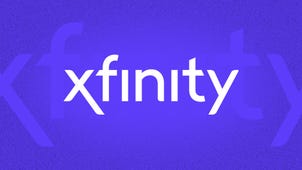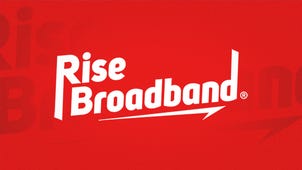

CenturyLink/Quantum Fiber – Best overall among internet providers in Colorado
- Prices: $30 – $70 per month
- Speeds: 200 – 940Mbps
- Key Info: Unlimited data, no contracts, equipment included with gigabit tier

Xfinity – Best cable internet provider in Colorado
- Prices: $20 – $300 per month
- Speeds: 75 – 6,000Mbps
- Key Info: Data caps on some plans, lots of plan options, solid customer satisfaction numbers

T-Mobile Home Internet – Best 5G home internet among ISPs in Colorado
- Prices: $50 per month
- Speeds: 72 – 245Mbps
- Key Info: Unlimited data, equipment included, no contracts, no additional fees

Rise Broadband – Best rural internet provider in Colorado
- Prices: $45 – $65 per month
- Speeds: 25 – 50Mbps
- Key Info: Unlimited data on some plans, low price increase

HughesNet – Most reliable speeds for satellite internet providers in Colorado
- Prices: $50 – $150 per month
- Speeds: 25Mbps
- Key Info: No hard data cap, nationwide availability
I recently visited lovely Colorado and spent time in Denver, where I experienced extreme internet envy over the fast speeds in the apartment where I stayed. Coming from New Mexico, where my choices are limited, Denver felt like a broadband wonderland. My Colorado internet experience blazed along thanks to Google Fiber Webpass, but it’s not my choice for the top ISP in Colorado due to limited availability. That honor goes to CenturyLink/Quantum Fiber as CNET’s pick for the best ISP overall in Colorado. CenturyLink’s (admittedly outdated) DSL service reaches far and wide across the state, but its affordable and desirable fiber offering can be found in the bigger cities.
CNET examines customer service, speed, pricing and overall value before recommending the best broadband in your area. You’ll find some fiber offerings in Colorado, but you’re more likely to run into cable provider Xfinity or CenturyLink DSL regarding wired internet. Fixed wireless ISPs primarily service the state’s gorgeous rural areas. Many small, local companies are working in this field, as well as Rise Broadband, a provider that services 15 other states.
Your internet options will be dependent on your location and can even vary quite a bit within the bigger metro areas. For example, Starry Internet, a fixed wireless ISP, mainly services apartment complexes, while CenturyLink Fiber is patchwork in its availability. Whether you’re in a super-modern Denver townhome or living in a log cabin in the forest, we’ve got ISP recommendations for you.
Best internet options in Colorado
An ideal provider will offer you fast, reliable internet at an affordable price. Ultimately, you’ll have to choose from the ISPs that service your location. That may mean fiber if you’re fortunate, or you may end up comparing cable, DSL, fixed wireless or even satellite internet offerings. It all starts with figuring out which ISPs can provide service to your home.
Note: The prices, speeds and features detailed in the article text may differ from those listed in the product detail cards, which represent providers’ national offerings. Your particular internet service options — including prices and speeds — depend on your address and may differ from those detailed here.
All prices listed on this page reflect available discounts for setting up paperless billing. If you decide not to go with automatic monthly payments, your price will be higher.
CenturyLink/Quantum Fiber
Best overall among internet providers in Colorado
Product details
Price range
$30 – $70 per month
Speed range
200 – 940Mbps
Connection
Fiber
Key Info
Unlimited data, no contracts, equipment included with gigabit tier
CenturyLink and its Quantum Fiber brand take top honors for best ISP in Colorado due to the wide availability of its DSL network and its limited — but fast and reliable — fiber service. DSL is outdated and doesn’t always give users a premium internet experience, but it’s often available in areas with few other options. Fiber, on the other hand, is my top recommendation for an internet connection if you can get it.
Availability: CenturyLink’s slower DSL network is widespread across the state. Fiber is focused in parts of the bigger metro areas of Denver, Boulder, Fort Collins and Colorado Springs. CenturyLink Fiber/Quantum Fiber (it has different names in different places) is CNET’s choice for the top ISP in Denver.
Plans and pricing: CenturyLink’s DSL service, also an option for some more rural locations, runs $50 per month for speeds up to 100 megabits per second. Depending on location, top speeds may be dramatically slower than that. You can find a sweet deal for fiber at the $70-per-month level for 940Mbps with a modem included.
Fees and service details: Opting for the slower 200Mbps fiber tier will run you $30, but you have to factor in a $15-per-month modem lease fee or purchase one for $200 upfront. You can also provide your own modem. The DSL service has the same modem terms. There are no contracts with either the DSL or fiber service.
Xfinity
Best cable internet provider in Colorado
Product details
Price range
$20 – $300 per month
Speed range
75 – 6,000Mbps
Connection
Cable
Key Info
Data caps on some plans, lots of plan options, solid customer satisfaction numbers
Xfinity’s wide variety of plans and availability in many metro areas across Colorado make it my recommendation for the best cable provider in the state. CNET also gave Xfinity the nod for best overall internet provider in Colorado Springs.
Availability: CenturyLink and Xfinity are neck-and-neck in terms of the number of residential units they reach in Colorado, according to FCC data, with both hovering right around 77%. Xfinity is particularly prevalent down the state’s center from Fort Collins in the north to Trinidad in the south.
Plans and pricing: Xfinity kicks off at $20 per month for 75Mbps service with a one-year contract. That low-price plan isn’t necessarily going to be your best deal. Check out some faster plans that include Wi-Fi equipment and unlimited data. On the top end, you’ll find a 1,200Mbps plan for $70 per month with no contract required.
Fees and service details: Xfinity plans require some scrutiny. Some require contracts, some don’t. Some come with Wi-Fi equipment, others don’t. Many plans are saddled with a 1.2TB data cap, but some offer unlimited data. Also, watch out for price increases after your initial promotional period is up.
T-Mobile Home Internet
Best 5G home internet among ISPs in Colorado
Product details
Price range
$50 per month ($30 for eligible mobile customers)
Speed range
72 – 245Mbps
Connection
Fixed wireless
Key Info
Unlimited data, equipment included, no contracts, no additional fees
Verizon and T-Mobile are making moves on the national broadband scene with 5G home internet delivered wirelessly to your residence. It’s worth comparing them, but I’m giving T-Mobile an edge in Colorado due to its availability in many cities nationwide.
Availability: T-Mobile’s home internet service can be found in Boulder, Colorado Springs, Denver, Fort Collins, Grand Junction, Pueblo and Steamboat Springs, among other cities. Open slots may be limited depending on location.
Plans and pricing: Pricing is simple. T-Mobile’s plan delivers typical download speeds of 72 to 245Mbps with uploads in the 15-31Mbps range for $50 per month. That price dips to $30 when bundled with a Go5G Plus or Magenta Max voice line.
Fees and service details: There are no data caps, and equipment is included. T-Mobile charges a $35 service fee for setup, but keep an eye out for a $50 rewards card to make up for that fee.
Rise Broadband
Best rural internet provider in Colorado
Product details
Price range
$45 – $65 per month
Speed range
25 – 50Mbps
Connection
Fixed wireless
Key Info
Unlimited data on some plans, low price increase
Rise Broadband is a rural specialist. As a fixed wireless provider, its main competitors are satellite ISPs and other fixed wireless ISPs. A broad reach and speeds up to 250Mbps in some areas earn it a nod as the best rural ISP in Colorado. CNET has also recognized Rise Broadband as a top rural internet provider nationwide.
Availability: Rise’s primary presence in Colorado is along the Front Range, I-25 and I-70 corridors, and the Western Slope.
Plans and pricing: Rise’s basic plan is $45 per month for speeds up to 250Mbps (where available). You may only be eligible for speeds in the 25-50Mbps range. That price is good for new customers for the first 12 months, and then the monthly bill goes up by $10.
Fees and service details: Rise offers unlimited data with its promotional plan. Keep an eye out for a free installation offer as well. A $10 required equipment rental fee per month brings the introductory price up to $55.
HughesNet
Most reliable speeds for satellite internet providers in Colorado
Product details
Price range
$50 – $150 per month
Speed range
25Mbps
Connection
Satellite
Key Info
No hard data cap, nationwide availability
Rural living in Colorado has many perks, but fast internet isn’t usually one of them. If you’re out of service zones for other wired or wireless options, satellite internet may come through. HughesNet has received recognition from CNET for its reliable speeds and gets a nod here as a functional — though not very fast — satellite option for rural internet. Compare it with Starlink, which may be able to deliver faster speeds to your location.
Availability: HughesNet is available across Colorado if you have a clear view of the southern sky.
Plans and pricing: Expect speeds up to 25Mbps. Pricing depends on how much data you want. It starts at $50 per month for 30GB on up to $125 per month for 100GB.
Fees and service details: When it comes to data allowances, there’s good and bad news. On the good side, HughesNet doesn’t have a hard data cap. However, your downloads may slow to a snail’s pace if you exceed your data allowance. Gear will cost you $450 upfront or a $15-per-month rental fee. There’s a two-year contract and a price hike after the first six months.
Rural internet options in Colorado
| Provider | Connection type | Price range | Speed range | Data cap | Availability |
|---|---|---|---|---|---|
| CenturyLink Home Internet | DSL | $50 | 3-100Mbps | None | Broadly across Colorado |
| Eastern Slope Technologies | DSL/fiber | $50-$130 | 6-1,000Mbps | None | Eastern Colorado |
| Edge Internet Service | Fixed wireless | $40-$100 | 10-200Mbps | None | Granby Ranch, Homestead Hills, Wolford Reservoir, Blue Valley Acres, Ute Pass, Green Mountain Reservoir |
| Elite Broadband | Fixed wireless | $50 | 25Mbps | None | Plateau Valley |
| Hilltop Broadband | Fixed wireless | $45-$165 | 4-50Mbps | None | Boulder, Chaffee, Custer, Fremont, Larimer and Weld counties |
| Kellin Communications | Fixed wireless | $70-$200 | 15-300Mbps | None | Front Range and Western Slope |
| NETEO | Fixed wireless | $35-$110 | 10-50Mbps | None | Denver, Conifer, Evergreen, Morrison, Aspen Park, Pine Junction, Bailey, Allenspark |
| Rise Broadband | Fixed wireless | $45 | 25-250Mbps | None | Front Range, I-25 and I-70 corridors, Western Slope |
| Xtream Internet | Fixed wireless | $89-$129 | 25-40Mbps | None | Castle Rock, Crested Butte, Gunnison |
Show more (5 items)
Colorado is a gorgeous state in which to live, with plenty of rural options that will get you closer to nature. However, the scenery and quiet may come at the cost of strong internet service. When seeking out internet for your rural residence, start with wired options. CenturyLink has a big DSL presence across Colorado, but speeds can vary considerably. You may be able to get 100Mbps, or you may only pull down a measly 3Mbps. T-Mobile Home Internet is another big name that may reach your home. Speeds can also vary quite a bit depending on your location, but it’s easy to test out the service if it’s available to you.
Fixed wireless is a common type of rural internet in Colorado. It requires a good line of sight to a tower, but it may be a more affordable and faster option than satellite, depending on your location. Our chart contains quite a few small, local fixed wireless ISPs that are focused on serving the rural reaches of Colorado. Fixed wireless doesn’t have to mean slow. Kellin Communications, for example, told CNET it plans to roll out 500Mbps speeds to the Front Range and Western Slope by early 2024. Here’s a comparison of the different types of home internet connections, from DSL to fixed wireless to 5G.
The ISPs listed in the chart aren’t the only ones serving Colorado. To find more local providers, plug your address into the FCC National Broadband Map. If other connection options fail you, then check into satellite from Starlink, Viasat or HughesNet. Satellite internet can be slow and expensive (especially with upfront equipment costs), but it may be the only option in some very rural locations or in areas where you don’t have a good line of sight to a fixed wireless tower.
Colorado broadband at a glance
100% of residences in Colorado can access services of at least 25Mbps down and 3Mbps up, according to the FCC National Broadband Map. That number doesn’t quite tell the whole story. That coverage includes the reach of satellite internet. While a download speed of 25Mbps qualifies as broadband in the eyes of the FCC, many internet users will find it to be on the slow side. The FCC’s estimate also doesn’t account for some of the trickier rural locations across Colorado — homes that may be on mountains or in heavily forested areas where fixed wireless and even satellite might have a hard time reaching.
The FCC has more to say about the availability of internet connection types in Colorado. Fiber — my favorite form of internet — reaches less than 30% of residences. Not surprisingly, you’ll find fiber clustered around the more populous areas like Denver and Colorado Springs. Cable and DSL connections are more widespread across the state.
How fast is Colorado broadband?
Ookla’s speed test data places Colorado 32nd among US states with a median download speed of about 176Mbps. Compare that to second quarter 2023 speed champ Florida, which was pulling down nearly 233Mbps. The national average was sitting around 205Mbps. Ookla updates its rankings regularly, so states can move around. However, Colorado’s showing places it firmly in the bottom half of the states for internet speeds.
According to Ookla, Xfinity takes the honor of being Colorado’s fastest fixed broadband provider with a median download speed of nearly 250Mbps. The cable provider is one of our top ISP recommendations for Colorado thanks to its broad reach across the state. Nationally, fiber internet has a reputation for being speedy. However, FCC data shows only about 11% of Colorado residences can access fiber with gigabit speeds. One place you can do that is in Fort Collins, where municipal fiber broadband plans go up to a whopping 10 gigabits.
Internet pricing in Colorado
Starting prices for internet in Colorado typically fall in the $40-$60 range, but there are some deals to be found. Xfinity, for example, offers a $20-per-month plan for 75Mbps service, but with a few catches. The price is good for 12 months with a one-year contract commitment, and equipment is not included. You can provide your own modem and router or rent one for $15 per month. CenturyLink offers a nice deal of 200Mbps for $30 per month with no contract. The equipment lease is an additional $15 per month. If we’re talking value, then check out CenturyLink’s 940Mbps fiber plan for $70 per month with a modem included.
Internet pricing can get complicated when you factor in renting or buying gear and plan prices that may jump after promotional periods expire. Check out these eight ways to save on your internet bill.
Internet for low-income households in Colorado
211,000 households in Colorado are enrolled in the federal Affordable Connectivity Program, according to the White House (PDF link). The ACP helps low-income Americans get free or cheap broadband. Most eligible households get $30 off their monthly bill, while households on tribal lands can get $75 per month. Most ISPs participate in the program, so check with your local providers about accessing a discounted plan.
Future of broadband in Colorado
The FCC defines broadband speeds as 25Mbps downloads and 3Mbps uploads. The Colorado Broadband Office, however, has loftier speeds in mind and defines broadband service as 100Mbps down and 20Mbps up. Based on that, the state’s broadband map shows about 90% of locations are served with those speeds. Going by the FCC definition, then 96% of locations are served. However, 25Mbps is pretty pokey by today’s standards, so I applaud Colorado for aiming higher. The state aims to connect 99% of Colorado households to high-speed (100Mbps) broadband by 2027.
The Colorado Broadband Office has invested nearly $100 million in programs designed to expand fast internet to reach its goal. Add over $826 million in federal funds through the Broadband Equity Access and Deployment program. Colorado’s mountainous and rural areas can be challenging to reach, but this BEAD funding should help push through broadband improvements across the state.
I perk up my ears whenever I hear about fiber expansion. It’s the top request on my internet wish list for just about any state. In good news for residents of Lakewood and Westminster, Google Fiber is coming to those areas. Google Fiber Webpass has been in Denver for some time, but this is fiber-to-the-home rather than the Webpass fixed wireless version of fiber internet. Fiber ISP Ting Internet is building fiber to Aurora, Colorado Springs and the Western Slope. These are big moves and a sign of advancement in broadband for the state overall.
How CNET chose the best internet providers in Colorado
Internet service providers are numerous and regional. Unlike the latest smartphone, laptop, router or kitchen tool, it’s impractical to personally test every ISP in a given city. So what’s our approach? We start by researching the pricing, availability and speed information drawing on our own historical ISP data, the provider sites and mapping information from the Federal Communications Commission at FCC.gov.
But it doesn’t end there. We go to the FCC’s website to check our data and ensure we’re considering every ISP that provides service in an area. We also input local addresses on provider websites to find specific options for residents. To evaluate how happy customers are with an ISP’s service, we look at sources including the American Customer Satisfaction Index and J.D. Power. ISP plans and prices are subject to frequent changes; all information provided is accurate as of the time of publication.
Once we have this localized information, we ask three main questions:
- Does the provider offer access to reasonably fast internet speeds?
- Do customers get decent value for what they’re paying?
- Are customers happy with their service?
While the answer to those questions is often layered and complex, the providers who come closest to “yes” on all three are the ones we recommend.
To explore our process in more depth, visit our how we test ISPs page.
Internet in Colorado FAQs
Does Colorado have good internet?
Is there fiber internet in Colorado?
Is CenturyLink or Xfinity better for internet service in Colorado?
